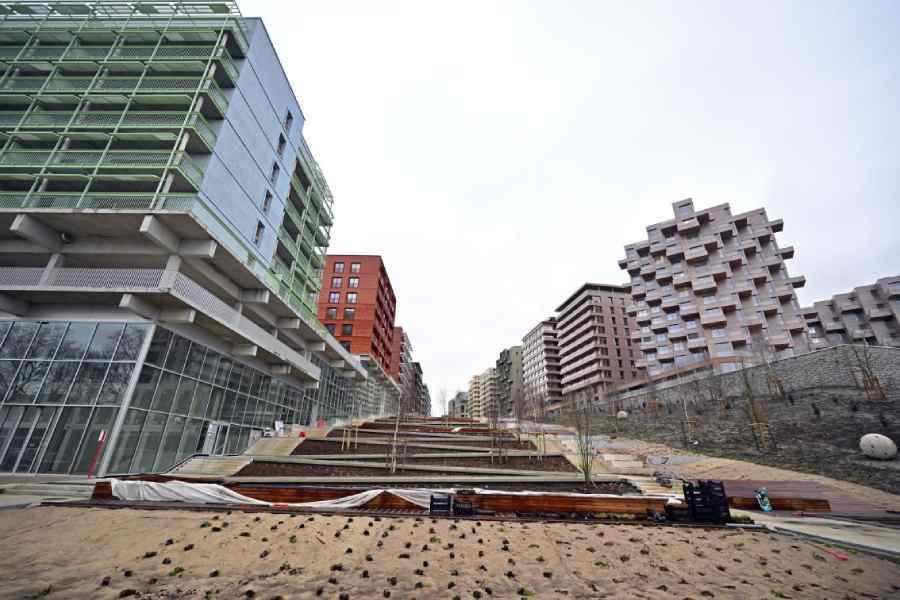Follow Paris
Sir — Nearly a century ago, when Paris hosted the summer Olympics, it made a special village, only to raze it down after the event was over. This year, however, it is building a sustainable village that is meant to last. Instead of tailor-made apartments, athletes will be living in what will become others’ homes or workplaces. Perhaps Bengali Puja committees could learn a thing or two from the French. Instead of spending lakhs on Durga Puja pandals each year, preserving parts of the stunning, roadside pandals and revamping them during the festival could prevent massive annual wastage.
Srijita Biswas, Calcutta
Tense ties
Sir — A pro-Khalistan group held a ‘citizen’s court’, burning an effigy of the Indian prime minister, Narendra Modi, outside the Indian consulate in Vancouver (“New strain on Canada relations”, June 20). This has, once again, stirred a controversy. Further, the Canadian Parliament observed a minute-long silence to mark the death anniversary of Hardeep Singh Nijjar, a Khalistani activist. This will affect bilateral relations between India and Canada. The Canadian prime minister, Justin Trudeau, seems reluctant to mend ties with India as it might upset the political equilibrium in Canada.
Janga Bahadur Sunuwar, Jalpaiguri
Sir — The assassination of Hardeep Singh Nijjar has created a rift between India and Canada (“Chill returns”, June 25). Justin Trudeau’s statement regarding the demise of Nijjar and the Canadian Parliament marking Nijjar’s death anniversary point to worsening bilateral ties. After the G7 Summit, Trudeau spoke of an “alignment” with India, raising hopes of an improved diplomatic relationship between the two nations. However, Trudeau has gone back on his words due to domestic pressures. Glorifying Khalistani supporters will damage Canada’s ties with India and jeopardise Ottawa’s commitment to fighting terrorism.
Gregory Fernandes, Mumbai
Sir — The Canadian prime minister seems to be afraid to rock the boat of domestic politics. This will cost Canada its relationship with an old ally.
S.S. Paul, Nadia
Sir — Last year, Hardeep Singh Nijjar, a radical Khalistani leader who was designated a terrorist by an Indian investigative agency, was shot dead in Surrey. India has, time and again, asserted that it stands against all forms of terrorism. This should send a clear message to Canada that pro-Khalistan elements should not be given space. As the Canadian government chooses to ignore India’s warnings and relentlessly pursue the appeasement of radicals, the ties between the two countries will be severely affected.
Khokan Das, Calcutta
Troubled waters
Sir — The chief minister of West Bengal, Mamata Banerjee, has strongly opposed the Centre’s decision to share the water of the Teesta (“Not feasible: CM on Teesta water sharing”, June 25). This is laudable. Teesta is a vital water source for irrigation, fisheries and consumption. Water, according to the Constitution, is within the state’s jurisdiction. Hence, decisions regarding Teesta can only be taken with the approval of all the stakeholders.
Banerjee’s concern regarding the Ganges Water Treaty of 1996 that failed to address India’s water shortage during summer is justified. Bangladesh must not lean towards China to pressure India into accepting a treaty that does not bode well for the latter.
Jayanta Datta, Hooghly
Sir — Mamata Banerjee has rightly questioned the feasibility of sharing the Teesta’s waters with Bangladesh. Lakhs of people in North Bengal will be affected due to the non-availability of water for irrigation and drinking. Banerjee is understandably miffed about the Centre overstepping into West Bengal’s affairs.
Fakhrul Alam, Calcutta
Sir — The Bengal government must come forth to assist India in achieving friendly ties with Bangladesh regarding the Teesta water treaty. The Centre cannot move ahead with the deal without Mamata Banerjee’s cooperation. She must put regional issues aside for the national interest. Bangladesh has been one of India’s oldest allies and it would not be wise to delay the treaty and risk bilateral ties.
Kirti Wadhawan, Kanpur
Act fast
Sir — The recent floods in Assam have wrought havoc on livestock, a critical lifeline for rural communities. Thousands of animals have perished, causing immense economic distress. This underscores the urgent need for robust disaster management strategies and sustainable infrastructure to safeguard the livestock. Immediate relief and veterinary support are imperative to prevent further losses, ensure the health of surviving animals, and protect the livelihoods of the Assamese people.
Mriganka Boruah, Guwahati










